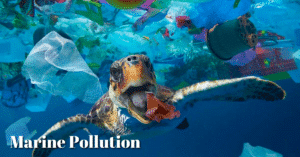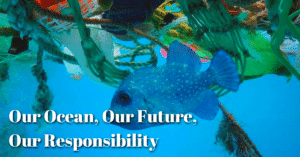On July 1st, the 2022 United Nations Ocean Conference, was held at Lisbon with world leaders adopting an action-oriented political declaration that would save our oceans in the coming years from any future threats. These threats include marine pollution, harmful fishing practices, acidification, and biodiversity loss.
The conference came together at a critical time, as the world is seeking to address several of the deep-rooted issues in our society that will require strong structural transformations and shared solutions. This conference has sought to propel science-based innovative solutions to start a new chapter of global ocean action.
Marine Pollution
The ocean covers almost 70% of the Earth’s surface and is one of the largest biospheres. It is home to 80% of all life in this world. The ocean water generates 50% of the oxygen we breathe, absorbs 25% of carbon dioxide present in the atmosphere(known as ocean acidification), and captures 90% of heat generated from emissions.
Oceans are not only the “lungs of our Earth” but also the largest carbon sinker and provides a vital buffer against the impending impacts of climate change. It helps nurture biodiversity, produces food, mineral, energy resources, and job opportunities.
This is why it’s so important for us to manage our oceans sustainably and this is set out in the targets of Sustainable Development Goal 14: Life Below Water. The ocean has faced threats in the past years due to rapid growth of human population and human activities that affects the ocean water. This impacts the ocean’s health and ability to grow life inside it.
To take immediate actions against climate change, diminishing biodiversity, diseases, pandemics, conflicts, strife, economic inequality, and food insecurity, we must take actions now to help protect the state of our oceans.
Our Ocean, Our Future, Our Responsibility
The Ocean Conference, co-hosted by the Governments of Kenya and Portugal, has come at a critical time when the world is seeking to start a new chapter in ocean action. The political declaration titled, “Our Ocean, Our Future, Our Responsibility” focuses on Sustainable Development Goal 14: Life Below Water and addresses greater actions required to save our oceans.
The Sustainable Development Goal 14: Life Below Water, was adopted in 2015 as a part of the 2030 Agenda for Sustainable Development and its set of 17 transformative goals. Goal 14 specifies the need to conserve and use the world’s seas, oceans, and marine resources sustainably. It also focuses on various ocean issues, that includes reducing marine pollution, protecting various marine and coastal ecosystems, minimizing acidification, ending illegal overfishing, and respecting international laws that call for the safe and sustainable use of our oceans and its resources.
“As leaders and representatives of our Governments, we are determined to act decisively and urgently to improve the health, productivity, sustainable use, and resilience of the ocean and its ecosystems,” the Heads of State, Government, and high-level representatives participating in the Conference said, expressing their deep regret over not being able to achieve several of the targets of Goal 14.
This week-long conference bought together over 6,500 participants from all over the world that included Heads of State and Government, representatives of civil society organizations, officials of intergovernmental organizations, as well as other stakeholders. The theme was, “Scaling Up Ocean Action Based on Science and Innovation for the Implementation of Goal 14: Stocktaking, Partnerships, and Solutions”. This political document, which was the outcome of this meeting, will be forwarded to the United Nations General Assembly’s upcoming 76th session for its endorsement.
The world leaders present at this conference said, “We know that restoring harmony with nature through a healthy, productive, sustainable, and resilient ocean is critical for our planet, our lives, and our future.” Urging other stakeholders to hold themselves accountable and take immediate actions to implement Goal 14 as soon as they can. They also talked about better understanding the impact of human activity on our oceans, mobilizing actions for sustainable fisheries and aquaculture, and shoring up fish stocks to produce maximum sustainable yields.
The participants of this conference also recognized that developing countries, especially small islands or least developed countries, will face financial and capacity challenges to implement Goal 14, hence they committed to provide scientific data, finance, and technology transfer, as well as capacity building.
During the UN Ocean Conference 2022, another major discussion was the value of preventing and trying to eliminate marine plastic litter, such as single-use plastics, through recycling and resource efficiency. This will enable sustainable consumption and will help customers and industries develop viable alternatives.
Overall, it’s delightful to see the various commitments and actions that were pledged during this conference.







